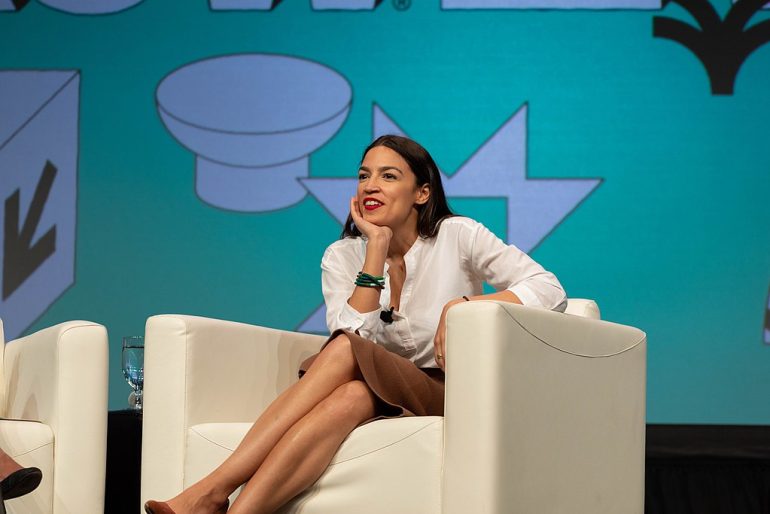One of the talking points the left uses fairly often is the idea of a “scarcity mindset.” Originally, this phrase was used in a self-help context to highlight a disempowering way of thinking, but it has since been appropriated by the left and given a somewhat different meaning.
Often this rhetoric comes up in the context of government spending. A progressive will advocate for some government subsidy or welfare program to help those in need. Their detractors will point out the cost, noting that you can’t get something for nothing. The progressive then responds by saying that’s just a “scarcity mindset.” If only we had an abundance mindset, they say, we could do a lot of good for a lot of people.
Rep. Alexandria Ocasio Cortez and activist Nina Turner both invoked this concept in recent tweets.
“I’ve said it before and I’ll say it again, not every program has to be for everybody,” said AOC. “Maybe student loan forgiveness doesn’t impact you. That doesn’t make it bad. I’m sure there are other things that student loan borrowers’ taxes pay for. We can do good things and reject the scarcity mindset that says doing something good for someone else comes at the cost of something for ourselves.”
— Alexandria Ocasio-Cortez (@AOC) August 27, 2022
“We must reject the scarcity mindset,” wrote Nina Turner. “Our government has the ability to fund programs that will help everyone.”
We must reject the scarcity mindset. Our government has the ability to fund programs that will help everyone.
— Nina Turner (@ninaturner) August 27, 2022
Twisting the Term
There’s a kernel of truth in this idea, as there often is in most talking points. In this case, the kernel of truth is that not everything is zero-sum. There is such a thing as a win-win transaction. It is possible for two people to benefit from a transaction with no one being worse off.
But just because win-win transactions are possible, that doesn’t mean they are the only kind of transaction. Win-lose transactions are also very possible.
Indeed, when Steven Covey coined the “scarcity mindset” and “abundance mindset” phrases in his book The 7 Habits of Highly Effective People, he uses them to distinguish what he calls the win-win paradigm from the win-lose paradigm.
“The third character trait essential to Win/Win is the Abundance Mentality, the paradigm that there is plenty out there for everybody,” Covey writes. “Most people are deeply scripted in what I call the Scarcity Mentality. They see life as having only so much, as though there were only one pie out there. And if someone were to get a big piece of the pie, it would mean less for everybody else. The Scarcity Mentality is the zero-sum paradigm of life.”
Covey’s point is that we should seek out win-win transactions wherever possible. The Scarcity Mentality, properly understood, is the belief that everything has to be win-lose. The truth, of course, is that it doesn’t have to be.
But when progressives invoke this phrase, they distort its meaning. The Scarcity Mentality, in their (improper) view, is the belief that win-lose transactions necessarily involve losers. To paraphrase AOC, if you suggest that government wealth transfers “come at the cost of something for ourselves,” that’s a “scarcity mindset” that we should “reject.”
Scarcity: A Fact of Life
Consider two people, let’s call them Peter and Paul (completely arbitrary names I assure you). If Peter has a pencil and Paul has a pen, and they both want what the other has, they can trade with each other, and that trade would be win-win.
But now let’s say Peter has money and Paul doesn’t, and I rob Peter to pay Paul. This is a win-lose transaction. Paul wins. Peter loses.
Now here’s the question. Is it a Scarcity Mentality to suggest that helping Paul “came at the cost” of hurting Peter? Is it a Scarcity Mentality to suggest that this kind of transaction is zero-sum as far as money is concerned? Is it a Scarcity Mentality to suggest that this “program” doesn’t, in fact, help everyone, but rather helps some by hurting others?
According to AOC and Nina Turner, this is the “scarcity mindset” that should be rejected.
In practice, what leftists mean by rejecting the “scarcity mindset” seems to be rejecting the idea of scarcity all together. They are basically telling us that government transfers of wealth can help people without hurting anyone.
This is not what Covey had in mind when he coined the term, and it’s also self-evidently wrong. Government wealth transfers, being win-lose transactions, necessarily involve losers. And that’s not a “scarcity mindset.” It’s just a fact.
“The government cannot give to anybody anything that the government does not first take from somebody else,” said Adrian Rogers.
“Either immediately or ultimately every dollar of government spending must be raised through a dollar of taxation,” wrote Henry Hazlitt in Economics in One Lesson.
“Everything we get, outside of the free gifts of nature, must in some way be paid for,” Hazlitt writes in a different section. “The world is full of so-called economists who in turn are full of schemes for getting something for nothing.”
Ironically, by advocating for government wealth transfers, leftists succumb to the very fixed-pie worldview that Covey warns against. They assume that in order to help some we must take from others. But Covey’s whole point is that this is the wrong approach. Government welfare is the embodiment of the win-lose paradigm that we’re supposed to avoid. Free-market transactions, by contrast, are the embodiment of a genuine abundance mindset.
Of course, leftists get lots of support for their schemes from the beneficiaries and would-be beneficiaries of welfare programs. And no wonder. As George Bernard Shaw noted, “A government that robs Peter to pay Paul can always depend on the support of Paul.”
But simply pointing to beneficiaries is not sufficient to justify an action. Every action has a cost, and for the action to be justified, the benefit must be shown to exceed the cost. So when they say “look at all the people who would be helped,” our immediate response should be “look at all the people who would be hurt.”
Leftists will also point to positive externalities (spillover benefits) that wealth transfers create. For instance, we all benefit when people are more educated, so even though we have to pay taxes for schooling, we also reap the rewards of living in a well-educated society.
But the need for keeping in mind unseen costs is just as relevant in the case of externalities. When they point to positive externalities (spillover benefits) that would be created by the wealth transfer, we should immediately point to positive externalities that would be foregone because of the transfer.
It’s not being pessimistic. It’s just being realistic.
The Social Welfare Argument
Having discussed the inescapable fact of scarcity and the resulting necessity of weighing benefits against costs, we are now in a position to steel-man the leftist argument.
The poor argument, which we have been discussing to this point, is to essentially say that scarcity doesn’t exist, that there are no costs to be considered. The better argument is to say, “Yes, there are costs and there are losers, but the benefits of [insert welfare program here] outweigh the costs. Some gain and some lose, but total social welfare is increased.”
To take it a step further, one could argue that for every person in society, the spillover benefits they receive because of the transfer are larger than the taxes they have to pay, such that everyone is technically a “net” beneficiary. This is a rather charitable interpretation of AOC and Turner’s comments, but it’s about the only way you can argue these policies ultimately harm no one (and are thus, by a technicality, win-win all around).
So, what’s wrong with this argument? The issue is that making this kind of society-wide cost-benefit judgment is simply impossible.
Many people assume that if a policy helps those they consider to be relatively “needy” and hurts those who are considered relatively “well off” then that increases social welfare. But this kind of analysis is subjective, arbitrary, and ultimately untenable.
The fact is, when we rob Peter to pay Paul, we have no way of knowing what that does for social welfare, because we can’t know (let alone measure) people’s internal mental states. There is no way of objectively comparing utility gains or losses between people (think of utility as happiness points). To use economics jargon, interpersonal utility comparisons (IUCs) are impossible.
The idea that Paul’s utility gains are greater than Peter’s utility losses is mere speculation. We have no way of knowing. Likewise, the idea that the spillover benefits to Peter (assuming there are any) are greater than the costs he was forced to incur is also speculative. You can assert it, but you have no way of proving it.
In short, the most we can say about the impact of wealth transfers on social welfare is that some people are likely better off while other people are likely worse off. There is no objective way of proving that the benefits outweigh the costs.
The question that must be asked of the leftists, then, is this. Seeing as one can’t justify wealth transfers on social welfare grounds because IUCs are impossible, on what grounds do you justify this policy? What is your argument for doing this?
As far as I know, they have none.
The Case against Welfare
“What’s your argument against doing this?” they may retort. “If IUCs are impossible as you say, then you can’t definitely say that this decreases social welfare either.” Fair enough.
But while we are limited in what we can say with certainty, there are still general tendencies we can consider. For instance, when Peter spends his own money on himself, he has a strong incentive to make sure he’s buying something that benefits him and is getting it at a good price. For example, when students invest in their own education or borrow (and actually pay back) money from private lenders, the students and lenders have an incentive to make sure it’s a good investment, both in terms of cost and quality.
But as Milton Friedman famously pointed out, when the robber is spending Peter’s money on a program for Paul, he has little incentive to care about how much the program costs, and he’s not particularly concerned about how well it meets Paul’s needs either. As we can see with student loans, the government doesn’t give much thought to whether the education it is subsidizing is paying off for the graduates. Indeed, the very fact that students are struggling to pay off their loans is an indication that their education has failed to provide them with the financial stability it was supposed to facilitate. It seems likely, then, that society’s resources will be better utilized when individuals can keep their own money and spend it on themselves as they see fit.
Now, if instead of a program you simply did a straight transfer of money from one person to another, you could avoid this pitfall. But you would still be operating under a win-lose paradigm, and this is the other thing we need to keep in mind.
Win-lose transactions guarantee that there will be a loser (before considering externalities). Yes, spillover benefits could conceivably be sufficient to compensate for the loss, but this is by no means a given. With win-win transactions on the other hand, everyone is guaranteed to be better off (before considering externalities). Again, it’s possible there will be spillover costs that outweigh the benefit, but this too is by no means a given. So which would you prefer? Which approach should we strive for? Win-lose or win-win?
If you’ve read Steven Covey, you know the answer.
So rather than giving handouts, let’s give the needy win-win opportunities. Let’s allow entrepreneurs to create jobs and let’s open up trade so people can establish more mutually beneficial arrangements. Let’s find ways to increase the wealth in society rather than simply redistribute the wealth we have.
AOC and Turner are right to say we should reject the scarcity mindset. But they have it all backwards. Government welfare is the scarcity-mindset solution to poverty. Free-market capitalism, where we make the pie bigger, is what a true abundance mindset looks like.
This article was adapted from an issue of the FEE Daily email newsletter. Click here to sign up and get free-market news and analysis like this in your inbox every weekday.

Patrick Carroll
Patrick Carroll has a degree in Chemical Engineering from the University of Waterloo and is an Editorial Fellow at the Foundation for Economic Education.
This article was originally published on FEE.org. Read the original article.





